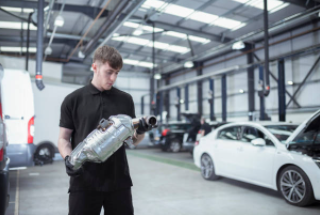Modern catalytic converters should last for up to 100,000 miles, whether on a small car or heavy track. Some experts argue that it should exhaust a lifespan of about 10 years before replacement.
However, as you already know, mileage is what determines the lifespan of any component in your car—not years. A catalytic converter exists between your car engine and the exhaust system. It protects the environment against pollution through chemical reactions.
As the name suggests, catalytic converters feature catalytic chambers coated with ceramic-coded beads. These beads catalyze the reactions of carbon dioxide and hydrocarbons into less harmful gases. That’s why your car emits water vapor in the exhaust.
These are just some facts about catalytic converters. However, there are a lot of rumors in the automotive industry about these parts. Let’s debunk them.
Table of Contents
1. You Need a High-Flow Catalytic Converter for Top Performance
First, you have to understand that there is no such thing as a high-flow converter. You might see some automotive parts adverts that claim to sell high-performance catalytic converters. In an actual sense, catalytic converters are the same in design and functionality.
For instance, all catalytic converters feature rhodium, platinum, and palladium coating. This coating converts harmful gases into water vapor after your car reaches a certain temperature. Thus, no magic can raise the catalytic temperature unless it’s from the exhaust system.
2. Catalytic Converters Store Impurities
As a new car owner, you might mistake the catalytic converter as a container for impurities. Well, that is wrong. Catalytic converters only facilitate the oxidation of unnecessary combustion products.
Depending on the type of your catalytic converter, it can either feature metallic or ceramic coating. This coating has special elements such as platinum. The element catalyzes carbon and hydrocarbon reactions to release them into less harmful gases.
That said, a catalytic converter cleans the impurities instead of storing them. Read a complete guide to understand how catalytic reactions happen in these automotive parts.
3. Catalytic Converters Can Block the Exhaust System and Affect Vehicle Performance
Car ownership comes with many questions. For instance, what affects my torque power? How about horsepower?
The performance of these automotive parts depends on the crankshaft. The faster it spins, the more power you get in the engine.
Modern catalytic converters don’t affect torque and horsepower. The only exception is if your car has one lambda probe.
In that case, the converter may affect the passage of exhaust gases in front of the catalyst. However, this is only prevalent in older cars, designed in the 1980s.
4. You Can Do With a Malfunctioned Catalytic Converter
Another myth that comes with vehicle ownership is that you don’t need a functional catalytic converter. Some people think this auto part doesn’t play any mechanical function. On the contrary, it determines the overall efficiency of your unit.
Moreover, some legal requirements might need your car to have a catalytic converter. Your unit might also undergo vigorous emissions testing before getting cleared. In that case, it’s imperative to ensure that you have a functional catalytic converter at all times.
Catalytic Converters Are as Important as Any Car Part
As a new car owner, it’s imperative to differentiate the myths and facts about automotive parts. Catalytic converters are critical if you’re going to reduce your carbon footprint. Most importantly, they don’t clog your exhaust but enhance efficiency.
Read other articles on this site for car ownership maintenance tips.
Follow me in social media:
